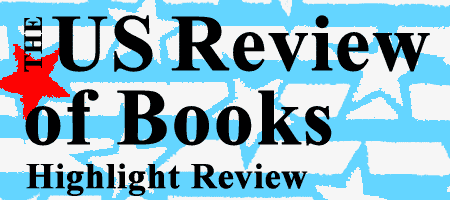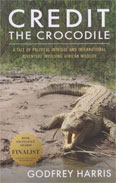
 |
Credit the Crocodile: A Tale of Political Intrigue and International Adventure Involving Wildlife
by Godfrey Harris
The Americas Group
Paul Martin and Tyler Williams are determined to give purpose to their gap year. At just eighteen years of age, the newly minted high school graduates immediately gravitate to Animal Welfare Enterprises' mission. What ensues is a trip to the South African countryside town of Happy Hollow with the intent of awakening the community to animal mistreatment on the Stewart farm and "to free the crocodiles" from any barriers that keep them from their natural habitat. It doesn't take long for this seemingly innocent freedom of expression by the boys to snowball into endless sequences of chaos and repercussions by a community and authorities determined to make an example of the duo.
Harris shifts the point of view routinely from the boys and their encounter with the people of Happy Hollow to Credit the Crocodile's journey and observations on the entire fiasco. To add further intrigue, Credit is incredibly observant and thinks critically about everything that happens around him, even if it is just musing on how parrots communicate on where to set their nests for mating season. The author effectively uses Credit's character in the novel to shed light upon the atrocities against other wildlife, primarily the ruthless slaughter of elephants in Kenya for their ivory and rhinos being killed in South Africa for their horns. There are numerous examples, but the more one thinks, the more one is forced to wonder whether humans aren't truly the "mindless beasts" in this entire cycle of predator and prey.
With the debate raging and teetering on outrage, Mrs. Nabala simply, yet vehemently, insists that wild animals cannot be respected if restrained within enclosures like zoos, as is largely the case in the United States. Ironically, the boys are so engrossed in their own perspective and words that they fail to see the resentment building up with every speech they make. While the mayhem only builds up for Paul and Tyler, the author provides a refreshing backstory of how Credit's desire to learn the meaning of individual sounds through rhythm and tone from the Stewart's son, Stephen, helped him evolve into an Obi Wan-esque character, the seemingly omniscient wiseman of the entire reptilian clan. When their paths inevitably intersect, Paul and Tyler are direct recipients of Credit's generosity and knowledge of the English language. Their lives unquestionably depend on their understanding and trust in him.
When Andy Mitchell, police chief of Happy Hollow, becomes privy to this gathering, he, along with Tom, the owner of Stewart Farm, immediately sets out to make an example of the boys. In unraveling the gravity of Paul and Tyler's predicament, the author seamlessly integrates several critical ideas that should not be overlooked. Chiefly, his characters are emphatically against the idea of outsiders coming to fix what isn't broken in the name of humanitarianism that dates back to colonial rule. Whereas Andy and Tom are steadfast in bringing the boys down, Stephen and Credit want to help the boys out of their predicament while simultaneously ingraining in their minds that preconceived notions prevent them from seeing just how beneficial the farm is to the crocodiles' existence and, on a grander scale, the existence and employment of a large portion of the Happy Hollow community.
The plot reaches a breakneck pace when Paul and Tyler are sentenced to two weeks of living in the bush. With the help of other crocodiles like Cynthia and Cecil, Credit is determined to make a breakthrough with the boys, both in helping them survive the two weeks from all the wild animals as well as showing them the difficulty life would present to the crocodiles if they were forced to live that "on-edge-all-the-time" lifestyle in their version of the wild. In particular, the comparison between the bush of Happy Hollow and the San Diego Wild Animal Park paints a stark contrast between the two and helps Credit make his point with far greater intensity.
As the boys' interact with Credit, their journey to a greater understanding of freedom and captivity begins. Though the political angle is referenced consistently throughout the novel, Harris uses Credit to send a far greater message to the boys, the animal welfare organization, and society as a whole: understand what a nation's realities are (in this case, South Africa and Happy Hollow) and communicate with those that they think may be oppressed so they can get a complete, assumption-free snapshot of the entire situation. Despite Paul and Tyler coming across as naive and almost robotic in their regurgitation of AWE manuals, Harris does a commendable job of showing their character arc and propelling them further into their purpose with the help of Credit. With fluid prose and thoughtful content, the novel engages and challenges the glamorization of "doing good," making for a meaningful read.